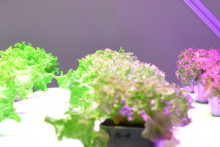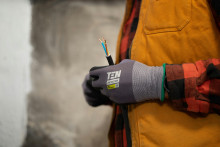‘Whilst the gut feeling of the breeder still remains very important, with digital phenotyping, we can complement this knowledge with a wealth of objective data’, says Marco van Schriek, who has dedicated himself to this technique for the past eight years. KeyGene has worked for four large breeders of vegetable seeds ‘Breeders often have a wealth of experience. With an experienced eye, they are able to see even the smallest differences between plants. Yet they fly between test populations, for example in Spain or in Morocco and thus, they witness only a particular moment in time. For example, it may have just rained, so they still don’t know how a plant might cope if exposed to heat stress for several days’, Van Schriek explains.
 More precise monitoring offers a solution. At KeyGene, plants are positioned on a conveyer belt, upon which they are led through an imaging room. ‘There they are photographed each day in exactly the same manner. From the side, from above, but we also take footage of the roots through a transparent pot. From these photographs, computer analysis maps over a hundred different characteristics of each plant every day. For example, you can see which plant recovers quickest after a period of drought, or which one is a shade darker green. It is almost impossible to observe these differences with the naked eye.’
More precise monitoring offers a solution. At KeyGene, plants are positioned on a conveyer belt, upon which they are led through an imaging room. ‘There they are photographed each day in exactly the same manner. From the side, from above, but we also take footage of the roots through a transparent pot. From these photographs, computer analysis maps over a hundred different characteristics of each plant every day. For example, you can see which plant recovers quickest after a period of drought, or which one is a shade darker green. It is almost impossible to observe these differences with the naked eye.’
In addition to companies that breed vegetables, KeyGene also caters for breeders who are involved in the production of rice, soy, corn, and the flower sector. In total, the company has experience in the digital phenotyping of 35 plant species. KeyGene also helps breeders by analysing the DNA of plants in order to enhance their characteristics, such as taste, drought resistance, resistance against diseases and pests, and a longer shelf life in new breeds. ‘One of our customers brought a type of salad to the market that is both tasty and resistant towards aphids. We have also helped to extend the shelf life of cucumbers. For the more complicated processes, such as drought resistance, we now see the first effects of digital phenotyping and we are expecting a lot more of this.’

Working at KeyGene, at the crossroads of biology, technology, and programming, offers Van Schriek an enormous challenge. ‘The work is very varied, and amongst others, you help to enlarge harvests or breed healthier crops. That is the beauty of this profession.’
plenty of opportunities
Research company KeyGene in Wageningen offers plenty of opportunities for graduates from technical universities. You can think of AI and deep learning using big data, for example for the development and use of genetic and phenotypic knowledge for plant breeding companies all over the world. The company is also conducting research into the use of high tech for innovative crop breeding, for example in the development of applicable advanced phenotyping techniques using multispectral cameras.







